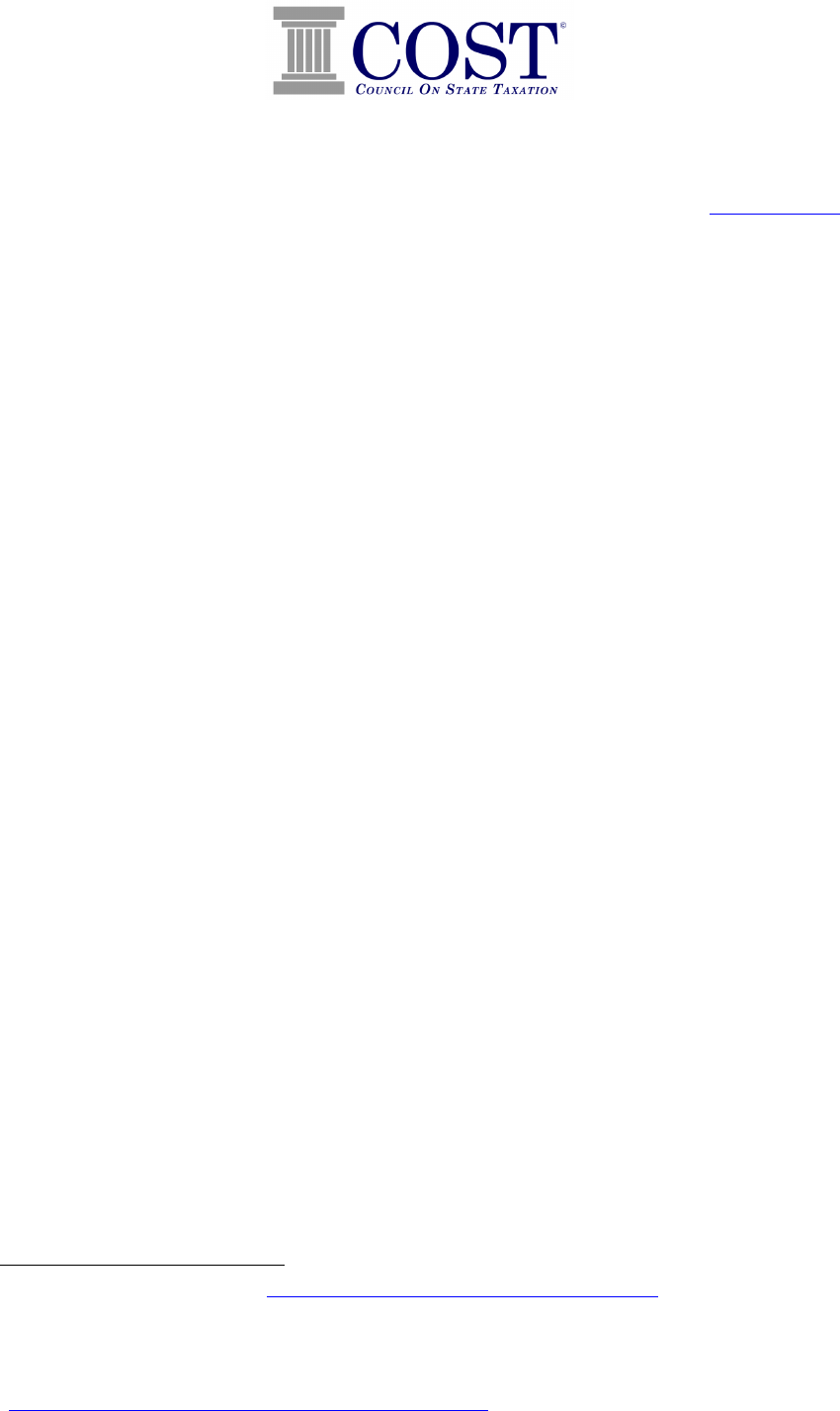
122 C Street, N.W., Suite 330 ● Washington, DC 20001-2109 ● Tel: 202/484-5222 ● Fax: 202/484-5229
Stephanie Do
Senior Tax Counsel
(202) 484-5228
May 14, 2024
Senator Anna Caballero, Chair
Senator Brian Jones, Vice Chair
Senate Committee on Appropriations
California State Legislature
Via Position Letter Portal
Re: COST Opposes S.B. 1327, Creating New Data Extraction Mitigation Fee
Dear Chair Caballero, Vice Chair Jones, and Members of the Committee:
On behalf of the Council On State Taxation (COST), I am writing to express opposition
to S.B. 1327, which would be amended to create a new data extraction mitigation fee.
Although labeled as a “fee,” it is structured like a digital advertising and data
collections tax. Governor Newsom has been steadfast in his commitment to not create
any broad-based tax increases.
1
This bill, however, directly contravenes with the
Governor’s stance.
The amendment establishes a new, controversial, and untested “fee” on gross receipts
derived from “data extraction transactions” in California, which, as defined in the
amendment, serves as a tax on digital advertising services and data collection. This
“fee” is ultimately a tax on business inputs that burdens businesses and consumers.
2
On
its face, the bill appears to be targeted with the negative impact limited to a few
technology companies. Unfortunately, the legislation will force impacted companies to
pass on the increased costs from this new “fee” on to other businesses and consumers
and will place California at a competitive disadvantage with respect to encouraging
businesses to maintain or expand operations in California.
This amendment violates federal law and several provisions of the U.S. Constitution. If
this bill is enacted, it will be embroiled in protracted litigation like Maryland’s digital
advertising gross revenues tax, which is still ongoing.
1
See Governor Gavin Newsom, “Proposed Budget Summary, Governor’s Message,” 2024-25 Governor’s
Budget, January 10, 2024.
2
Business inputs constitute intermediate, not final, goods and services because companies either resell
these goods and services or use the materials, products, machinery, and services to produce other goods
or services that subsequently are sold to households. See Karl A. Frieden and Douglas L. Lindholm,
“State Digital Services Taxes: A Bad Idea Under Any Theory,” Tax Notes States, April 10 2023, p. 89
(discussion of how digital services taxes add to the pyramiding of sales and gross receipts taxes).
Officers, 2023-2024
Michael F. Carchia
Chair
Capital One Services, LLC
Mollie L. Miller
Vice Chair
Fresenius Medical Care
North America
Jamie S. Laiewski
S
ecretary & Treasurer
Charter Communications
Robert J. Tuinstra, Jr.
Immediate Past
Chair
Corteva Agriscience
Arthur J. Parham, Jr.
Past
Chair
Entergy Services,
LLC
Amy Thomas Laub
Past Chair
Nationwide Insurance Company
Patrick J. Reynolds
President
Council On State Taxation
Directors
Madison J. Barnett
The Coca
-Cola Company
C. Benjamin Bright
HCA
Healthcare, Inc.
Lani J. Canniff
Ameriprise Financial, Inc.
Susan Courson
-Smith
Pfizer Inc
.
Karen DiNuzzo
-Wright
Walmart Inc.
Laura James
Kimberly
-Clark Corporation
Jeffrey A. Langer
The Home Depot
Stephen J. LaRosa
Alexion Pharmaceuticals, Inc.
Toni Mincic
Lumen Technologies
John H. Paraskevas
Exxon Mobil Corporation
Michael R. Raley
VF Corporation
Patrick A. Shrake
Cargill, Incorporated
Kyle Snedaker
Conagra Brands, Inc.
Beth L. Sosidka
AT&T Services, Inc.
Archana Warner
Constellation Energy
Corporation
Emily T. Whittenburg
Nike, Inc.

Council On State Taxation (COST) May 14, 2024
COST Opposes S.B. 1327, Creating New Data Extraction Mitigation Fee Page 2
These activities are also already sufficiently taxed under the State’s corporate income tax
regime.
3
An additional tax is not warranted.
About COST
COST is a nonprofit trade association based in Washington, DC. COST was formed in 1969 as
an advisory committee to the Council of State Chambers of Commerce and today has an
independent membership of approximately 500 major corporations engaged in interstate and
international business. COST’s objective is to preserve and promote the equitable and
nondiscriminatory state and local taxation of multijurisdictional business entities. Many COST
members have operations in California that would be negatively impacted by this legislation.
Negative Impact to California Businesses and Consumers
The proposed data extraction mitigation fee serves as a gross receipts tax on business inputs. The
COST Board of Directors has adopted formal policy statements opposing both gross receipts
taxes and sales taxes on business inputs based on sound tax policy principles. While the position
on business inputs primarily concerns the states’ sales taxes, its logic also applies to the proposed
data extraction mitigation fee, which serves as a gross receipts tax on business inputs. COST’s
policy positions are:
Gross receipts taxes are widely acknowledged to violate the tax policy
principles of transparency, fairness, economic neutrality, and competitiveness;
generally, such taxes should not be imposed on business.
4
Imposing sales taxes on business inputs violates several tax policy principles
and causes significant economic distortions. Taxing business inputs raises
production costs and places businesses within a State at a competitive
disadvantage to businesses not burdened by such taxes. Taxes on business
inputs, including taxes on services purchased by businesses, must be avoided.
5
The imposition of the proposed data extraction mitigation fee is primarily focused on taxing
business inputs, not consumer purchases. This disproportionate taxation of business inputs
violates several core tenets of sound tax policy—transparency, economic neutrality, effective tax
administration, and fairness.
• Transparency. A transparent tax, like the sales tax on consumer purchases, is obvious to
the taxpayer, and its economic effects are easily understood. The proposed data extraction
mitigation fee, on the other hand, serves as a stealth tax that will affect California
businesses and residents in several unseen ways. It will impact residents as purchasers, by
imposing hidden costs and thus making the products they purchase more expensive, and
3
See Karl A. Frieden and Stephanie T. Do, “State Adoption of European DSTs: Misguided and Unnecessary,” Tax
Notes State, May 10, 2021, p. 577; Karl A. Frieden and Douglas L. Lindholm, “State Digital Services Taxes: A Bad
Idea Under Any Theory,” Tax Notes State, April 10 2023, p. 89.
4
COST, “Gross Receipts Taxes, Policy Position”(last visited May 3, 2024).
5
COST, “Sales Taxation of Business Inputs, Policy Position” (last visited May 3, 2024).

Council On State Taxation (COST) May 14, 2024
COST Opposes S.B. 1327, Creating New Data Extraction Mitigation Fee Page 3
as workers, by depressing investment and thus reducing wages and employment
opportunities.
• Economic Neutrality. An economically neutral tax does not influence business choices
(of location, of operational entity, of suppliers, etc.). This “fee” will force companies to
either pass their increased costs on to consumers or reduce their economic activity in the
State to remain competitive with other companies in other states that do not bear the
burden of such taxes and fees.
• Effective Tax Administration. Effective tax administration is enabled by taxes that can be
easily administered by a state and can facilitate voluntary compliance by all businesses.
This entails tax base and sourcing rules that are comprehensible to both tax
administrators and taxpayers. This proposal is anything but easy to administer. As an
untested and novel tax, companies will have to adopt sophisticated accounting and
recordkeeping systems to evaluate transactions on a continuous basis. This proposal also
does not conform to or harmonize with any prior national or uniform state model, leading
to additional complexity.
• Fairness. A fair tax treats similarly situated taxpayers equally. Instead of having a broad
base and low tax rate, the proposed data extraction mitigation fee is imposed in a punitive
manner intended to directly target a select number of technology companies.
Violates Federal Law and the U.S. Constitution
The proposed data extraction mitigation fee will be immediately embroiled in protracted
litigation. Since the proposal would apply to digital advertising but not to non-digital advertising,
the law would likely violate the federal Internet Tax Freedom Act (ITFA). The ITFA, which was
first enacted in 1998 and subsequently extended until made permanent in 2016, preempts state
and local governments from levying multiple and discriminatory taxes on electronic commerce.
6
This proposed “fee” specifically singles out (discriminates against) digital advertising without
similarly applying to traditional forms of advertising. The bill also raises valid threats of
constitutional challenges.
The legality of such a “fee” under the ITFA and the U.S. Constitution is already mired in
litigation challenging Maryland’s digital advertising gross revenues tax.
7
Although this “fee” is
structured differently than Maryland’s digital advertising gross revenues tax, California would
nevertheless face similar controversy and judicial review should this bill be enacted. And
California would bear the costs to litigate this proposal without generating the anticipated
revenue because the proposal likely violates the ITFA and the U.S. Constitution.
6
Public Law 114-125, § 922(a).
7
See Michael Bologna, “Apple, Peacock Battle for Top Position in Maryland Ad Tax Fight,” Bloomberg Daily Tax
Report, February 13, 2024 (discussing the ongoing litigation in state court); Sanjay Talwani, “Md. Digital Ad Tax
Rule Illegally Bars Speech, Chamber Says,” Law360, April 10, 2024 (discussing the ongoing litigation in federal
court).

Council On State Taxation (COST) May 14, 2024
COST Opposes S.B. 1327, Creating New Data Extraction Mitigation Fee Page 4
Businesses Subject to the Data Extraction Mitigation Fee Are Already Subject to the
State’s Corporate Income Tax
Businesses which would be subject to this new “fee” under S.B. 1327 are already subject to the
State’s corporate income tax on their net income. California’s corporate income tax requires
mandatory unitary combined reporting, and it is imposed on the privilege of exercising corporate
franchises within the State. This imposition threshold gives the State expansive jurisdiction to
impose its corporate income tax without requiring a physical presence in the State. As a result,
the same businesses that would be subject to the proposed data extraction mitigation fee are also
subject to the State’s corporate income tax. California also imposes a market-based sourcing
regime for receipts from services and apportions such receipts using a single-sales factor
formula. Market-based sourcing seeks to tax a receipt based on where the customer receives the
benefits from the service rather than the location of the taxpayer. To the extent a business
collects digital advertising revenue or revenue from data collection in California, that income is
already sourced to California for corporate income tax purposes under the State’s market-based
sourcing rules. Under the single-sales factor apportionment formula, the physical location of a
corporation’s business now has minimal effect on how receipts are apportioned to the State. As a
result, California’s corporate income tax regime sufficiently taxes the same activities that would
be subject to the proposed data extraction mitigation fee.
The Barter Transaction Justification for the New Data Extraction Mitigation Fee Is Wrong
The proposal uses a novel untaxed “barter” transaction theory as a justification for the new data
extraction mitigation fee. This “justification,” however, is wrong and based on a false
equivalency between the limited number of barter transactions historically included in the sales
tax base. These are voluminous Internet-based exchanges. The exchange of free internet services
and other website functionality for consumer data and viewed advertisements has the appearance
of an “untaxed” non-monetized barter transaction, but they are not “retail” transactions.
Taxable barter arrangements, however, are fundamentally different from social media or digital
marketplace transactions because taxable barter transactions are completed and final transactions
between two parties and digital platform transactions are intermediate and not final transactions.
8
In other words, digital platform exchanges are part of intermediary streams of interactions where
sales taxes are generally imposed at the final retail stage, e.g., end user purchaser.
9
8
Generally, a sales tax base does not include non-monetized transactions. The basic premise of a consumption tax is
to impose a tax on receipts from a sale of monetized goods and services. However, there is a limited barter exception
to this rule. A typical taxable barter transaction is the one-to-one exchange of goods or services without use of a
monetary medium that would otherwise go untaxed, such as auto repair services exchanged for cleaning services or
agricultural crops exchanged for tangible goods. In these circumstances, assuming the goods or services would
otherwise be included in the sales tax base if sold directly to a consumer, the barter transaction avoids sales tax
unless both sides of the transaction are included in the sales tax base.
9
This is evident whether the barter transaction precedes (and enhances) a business-to-consumer sale on the digital
platform itself or paves the way for a targeted digital advertisement, which then is followed by a “downstream”
purchase by a consumer of the advertised good or services. For a more in-depth critique of the “barter” transaction
justification, see Karl A. Frieden and Douglas L. Lindholm, “State Digital Services Taxes: A Bad Idea Under Any
Theory,” Tax Notes State, April 10 2023, p. 98-104.

Council On State Taxation (COST) May 14, 2024
COST Opposes S.B. 1327, Creating New Data Extraction Mitigation Fee Page 5
Conclusion
COST continues to agree with the California Taxpayers Association (CalTax), the Association of
National Advertisers (ANA), and others who argue that the proposed data extraction mitigation
fee should be rejected. We respectfully oppose S.B. 1327 as it is a direct tax on business inputs,
based on a false equivalency with taxable barter transactions, and violates several key tax policy
principles as well as federal law and the U.S. Constitution. Digital advertising and data collection
activities are also already subject to California’s corporate income tax, which would result in the
proposed data extraction mitigation fee serving as a second or “double” tax.
Respectfully,
Stephanie T. Do
cc: COST Board of Directors
Patrick J. Reynolds, COST President & Executive Director
